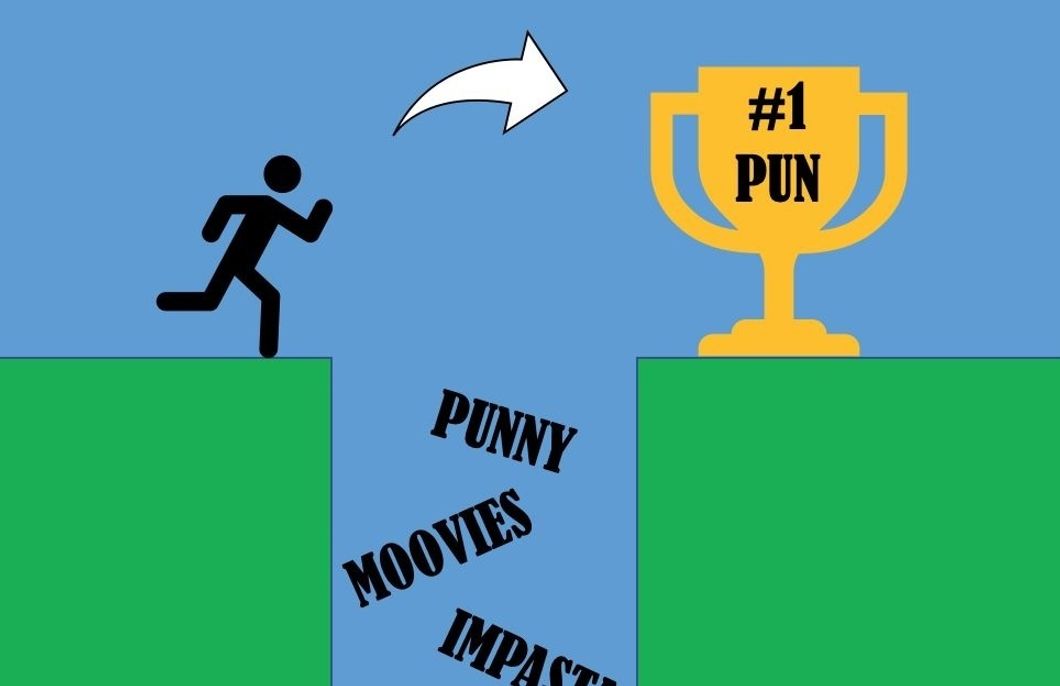We have a pundamental problem. You just sighed–literally, mentally, and/or painfully–at that horrible introduction, for something is inherently egregious about those eye-roll-inducing wordplays that lie between ingenious and idiotic.
The aftermath of a pun is a groan of agony, followed swiftly by a cry of questioning despair and the lingering taste of disgust. Notice how laughter was absent in that chain of events. Now I'm no expert, but I think that quantifies a joke as "unsuccessful," "unfunny," and "understand I'm saying this out of love, son, but I don't think you should pursue a career in comedy."
After providing a variety of puns that overwhelmingly underwhelmed my friends and family alike, I began to muse over this lack of amusement. Is every sentence with a pun in it a punishment, or do I simple not have a whit of wit? But then I realized the fault was not with the material or the maker (a debatable assumption made for my mental well-being); the crime's culprit: the mode of delivery.
"Explaining a joke is like dissecting a frog," said "The New Yorker" contributor E. B. White. "You understand it better but the frog dies in the process." This quote is humorous because the writer is comparing joke analysis to the probing of an amphibian, remarking that doing so in turn makes the aforesaid joke less funny, and thus "kills it."
You see what he means? When punning though, the explanation comes in a peculiar form. People emphasize the syllables to ensure everyone punderstands how punny they are, and that this is the punch line, and I'm getting puncomfortable, so please laugh at my joke. Yet if you want chuckles or chortles, you can never ask for them.
But wait! Doesn't that mean it's the maker who messed up?
Well yes, but actually no. Punning is a catch-22: you either emphasize the pun, begging for laughs; or you say it regularly, and Craig just thinks you mispronounced "excellent" and keeps frying his eggs. When playing the game of wordplay, you're either seen as a terrible comic or not seen at all, unless you follow the Perfect-Pun Principle: to make your puns both good and heard, never ever make up a word.
I'm a hypocrite, I know. This whole article has been filled with multisyllabic words that have "pun" slapped to the front of them, and it's punfortunate for sure. Yet the principle still stands; smashing two words together is similar to how my mom described childbirth: it's rather unpleasant, you have to force it, and what you get is a disappointment.
The prime pun is one with an actual word that plays off of double meanings. Craig wants to yell at Greg for using all the chives? Well, you wouldn't want to egg him on.
This can still be seen as a sigh-worthy statement, yet to most it will be seen as a humorous and clever choice of diction. You aren't awkwardly emphasizing a syllable, and no one can think it was just a mispronunciation. It is a pun of grace, poise, and pure sophistication.
But there's one problem: a pun of high value requires more thought, yet the moment to quip is only so long. Let's face it, despite cinema's back-and-forth banter that's laced heavily with zingers (looking at you, MCU), most of us think up our best comebacks hours after it happened. When we finally create our "jerk store" joke of the century, the time to say it has long since passed, for we have created our retorts at the remarkable gait of a speckled Cape tortoise.
So, what do we do now? Well, we could hold our tongues and never say those word combos of questionable quality, or, you know, not. We can't follow the Perfect-Pun Principle ad infinitum, so sometimes a poor pun should be said just because you'd like to. Oftentimes, the terribleness of the word play is what makes it funny, and though I hope that you'll be able to craft a flawless pun at some point, go ahead and say "eggsellent" a little louder next time you make breakfast.
But whenever it's possible, remember the rule: to make your puns both good and heard, never ever make up a word.
Scenario: Chef Craig drops his eggs.
What do you say?
A) "Eggsaclty why you should be more careful!"
B) "I'd say to look on the bright side, but they're sunny-side down."
If you chose B, you passed! And if you picked A, understand I'm saying this out of love, but I don't think you should pursue a career in comedy. Now go grab a napkin, you've got egg yolk in your Crocs.
- How to Write Puns: Advice From a Competitive Punner | Reader's ... ›
- How to Make Puns Without Making Enemies ›
- How to pun by Andy Jiang ›
- A Guide to English Puns and Wordplay ›
- Speech: How does one become good at puns? - Quora ›
- How to Make a Pun (with Pictures) - wikiHow ›
- How to Pun Like The Masters - YouTube ›





















